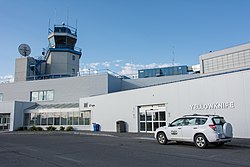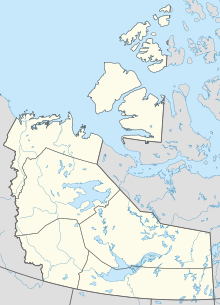Yellowknife Airport
Yellowknife Airport Aéroport de Yellowknife[1] | |||||||||||||||
|---|---|---|---|---|---|---|---|---|---|---|---|---|---|---|---|
 | |||||||||||||||
| Summary | |||||||||||||||
| Airport type | Public | ||||||||||||||
| Owner/Operator | Government of the Northwest Territories[2] | ||||||||||||||
| Location | Yellowknife, Northwest Territories | ||||||||||||||
| Hub for | Adlair Aviation, Air Tindi, Buffalo Airways, Canadian North, Northwestern Air, Summit Air | ||||||||||||||
| Time zone | MST (UTC−07:00) | ||||||||||||||
| • Summer (DST) | MDT (UTC−06:00) | ||||||||||||||
| Elevation AMSL | 675 ft / 206 m | ||||||||||||||
| Coordinates | 62°27′47″N 114°26′25″W / 62.46306°N 114.44028°W | ||||||||||||||
| Website | www | ||||||||||||||
| Map | |||||||||||||||
 | |||||||||||||||
| Runways | |||||||||||||||
| |||||||||||||||
| Statistics (2014) | |||||||||||||||
| |||||||||||||||
Yellowknife Airport (IATA: YZF, ICAO: CYZF) is located in Yellowknife, Northwest Territories, Canada. The airport is part of the National Airports System, and is operated by the Government of the Northwest Territories. The airport has regular scheduled passenger service and a number of freight services. In 2007, the terminal handled 527,000 passengers.[6]
In 2008 the airport's passenger terminal underwent an expansion to the departure/check-in section, roughly doubling the size of the terminal.[7] The airport is classified as an airport of entry by Nav Canada and is staffed by the Canada Border Services Agency (CBSA). CBSA officers at this airport can handle general aviation aircraft only, with no more than 15 passengers.[3]
The Royal Canadian Mounted Police (RCMP) "G" Division maintains a hangar for its air section just south of the passenger terminal. It is adjacent to a hangar used by the Royal Canadian Air Force (RCAF) to house the CC-138 Twin Otter and other utility aircraft operated by 440 Transport Squadron, a subsidiary of 8 Wing.
Canadian NORAD Region Forward Operating Location Yellowknife is located south-west of the airstrip. It was built for forwarding deployment of the McDonnell Douglas CF-18 Hornet in times of conflict.
History
[edit]Yellowknife Airport was initially built by Canadian Pacific Airlines in 1944, then sold to the federal Department of Transport in 1946.[8] A new terminal building was built in 1963 and control tower in 1972. Renovation to these facilities were completed in 1967, 1998 and 2005-2006.[9]
During the 2023 Canadian wildfires the city of Yellowknife was evacuated, and so the airport served as a means for evacuees to leave the city.[10] Air Canada added extra flights to assist with the evacuation before suspending service to Yellowknife due to the fires.[11]
Airlines and destinations
[edit]Passenger
[edit]| Airlines | Destinations |
|---|---|
| Air Canada | Toronto–Pearson[12] |
| Air Canada Express | Edmonton, Vancouver |
| Air Canada Rouge | Seasonal: Toronto–Pearson[12] |
| Air North | Seasonal: Ottawa, Toronto–Pearson,[13] Whitehorse |
| Air Tindi | Fort Simpson, Edmonton (begins 17 January 2025)[14], Fort Chipewyan (begins 17 January 2025)[14], Fort Smith (begins 17 January 2025)[14], Gamèti, Hay River, Lutselk'e, Wekweètì, Whatì[15] |
| Canadian North | Cambridge Bay, Edmonton, Fort Simpson, Gjoa Haven, Hay River, Inuvik, Iqaluit, Kugaaruk, Kugluktuk, Norman Wells, Ottawa,[16] Rankin Inlet, Taloyoak, Ulukhaktok[17] |
| Northwestern Air | Fort Smith (ends 16 January 2024)[14] |
| North-Wright Airways | Colville Lake, Déline, Fort Good Hope, Norman Wells, Tulita[18] |
| WestJet | Calgary |
| WestJet Encore | Calgary, Edmonton |
Cargo
[edit]| Airlines | Destinations |
|---|---|
| Buffalo Airways | Cambridge Bay, Déline, Edmonton, Fort Good Hope, Hay River, Kugluktuk, Norman Wells, Tulita |
Emergency services
[edit]

The airport has its own fire and rescue service. The department has ten firefighters, but requires only two or three firefighters on shift to operate a single crash tender. Ambulance and additional fire response are provided by the Yellowknife Fire Department.[19]
See also
[edit]References
[edit]- ^ "Aéroport de Yellowknife" (in French). Government of Northwest Territories. Retrieved 8 May 2019.
- ^ Airport Divestiture Status Report
- ^ a b Canada Flight Supplement. Effective 0901Z 16 July 2020 to 0901Z 10 September 2020.
- ^ Synoptic/Metstat Station Information
- ^ Total aircraft movements by class of operation — NAV CANADA towers
- ^ "Yellowknife Airport Development Plan Update" (PDF). Archived from the original (PDF) on April 18, 2014.
- ^ Yellowknife Airport Expansion
- ^ "Yellowknife | the Canadian Encyclopedia".
- ^ "MLAs debate Yellowknife airport expansion". 6 April 2022.
- ^ "Yellowknife fires: Evacuees pack road and air routes ahead of noon deadline". BBC News. 2023-08-18. Retrieved 2023-08-19.
- ^ AIRLIVE (2023-08-18). "Evacuation continues from Yellowknife airport, Air Canada adds extra flights, as wildfires get closer to the city". AIRLIVE. Retrieved 2023-08-19.
- ^ a b "AIR CANADA NW23 DOMESTIC SERVICE CHANGES – 20AUG23". Aeroroutes.com. 22 August 2023. Retrieved 31 August 2023.
- ^ "Announcing Service to Toronto, Ontario". Air North. Retrieved 28 November 2021.
- ^ a b c d Williams, Ollie (23 December 2024). "Air Tindi sets out how Fort Smith flights will look from mid-January". Cabin Radio. Retrieved 28 December 2024.
- ^ "Flight Schedules". Air Tindi. 12 April 2021. Retrieved 20 June 2021.
- ^ "Introducing Canadian North One-Day Express Flights!". Archived from the original on 2023-06-04.
- ^ "Flight Schedule". Canadian North. Retrieved 20 June 2021.
- ^ "Spring/Summer Schedules" (PDF). North-Wright Airways. 12 April 2021. Retrieved 20 June 2021.
- ^ "Aircraft Fire Fighting Services".
External links
[edit] Media related to Yellowknife Airport at Wikimedia Commons
Media related to Yellowknife Airport at Wikimedia Commons- Official website
- Entry about Yellowknife Airport on the Canadian Owners and Pilots Association's Places to Fly Airport Directory
- Past three hours METARs, SPECI and current TAFs for Yellowknife Airport from Nav Canada as available.


